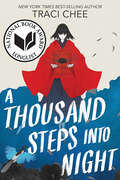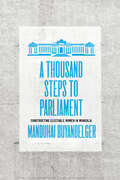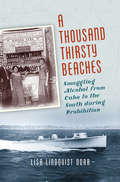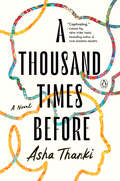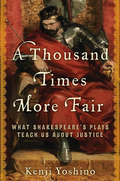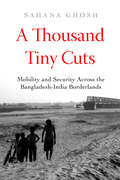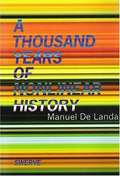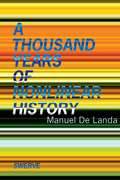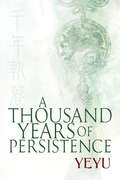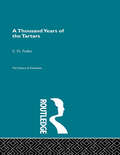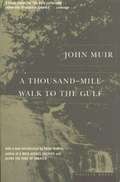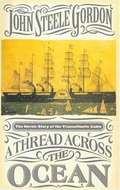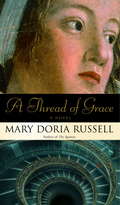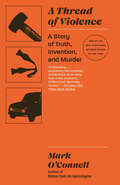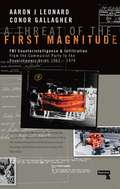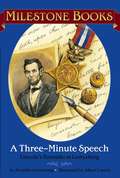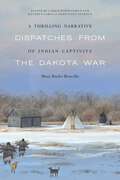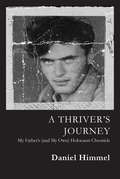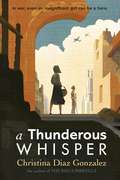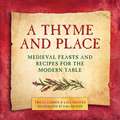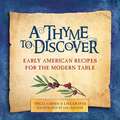- Table View
- List View
A Thousand Steps into Night
by Traci CheeFrom New York Times bestselling author and National Book Award finalist Traci Chee comes a Japanese-influenced fantasy brimming with demons, adventure, and plans gone awry. <p><p> In the realm of Awara, where gods, monsters, and humans exist side by side, Miuko is an ordinary girl resigned to a safe, if uneventful, existence as an innkeeper’s daughter. <p><p> But when Miuko is cursed and begins to transform into a demon with a deadly touch, she embarks on a quest to reverse the curse and return to her normal life. Aided by a thieving magpie spirit and continuously thwarted by a demon prince, Miuko must outfox tricksters, escape demon hunters, and negotiate with feral gods if she wants to make it home again. <p><p> With her transformation comes power and freedom she never even dreamed of, and she’ll have to decide if saving her soul is worth trying to cram herself back into an ordinary life that no longer fits her… and perhaps never did.
A Thousand Steps to Parliament: Constructing Electable Women in Mongolia
by Manduhai BuyandelgerA Thousand Steps to Parliament traces how the complicated, contradictory paths to political representation that women in Mongolia must walk mirror those the world over. Mongolia has often been deemed an “island of democracy,” commended for its rapid adoption of free democratic elections in the wake of totalitarian socialism. The democratizing era, however, brought alongside it a phenomenon that Manduhai Buyandelger terms “electionization”—a restructuring of elections from time-grounded events into a continuous neoliberal force that governs everyday life beyond the electoral period. In this way, electoral campaigns have come to substitute for the functions of governing, from social welfare to the private sector, requiring an accumulation of wealth and power beyond the reach of most women candidates. In A Thousand Steps to Parliament, Buyandelger shows how successful women candidates instead use strategies of self-polishing to cultivate charisma and a reputation for being oyunlag, or intellectful. This carefully crafted identity can be called the “electable self”: treating their bodies and minds as pliable and renewable, women candidates draw from the same practices of neoliberalism that have unsustainably commercialized elections. By tracing the complicated, contradictory paths to representation that women in Mongolia must walk, A Thousand Steps to Parliament holds a mirror up to democracies the world over, revealing an urgent need to grapple with the encroaching effects of neoliberalism in our global political systems.
A Thousand Steps to Parliament: Constructing Electable Women in Mongolia
by Manduhai BuyandelgerA Thousand Steps to Parliament traces how the complicated, contradictory paths to political representation that women in Mongolia must walk mirror those the world over. Mongolia has often been deemed an “island of democracy,” commended for its rapid adoption of free democratic elections in the wake of totalitarian socialism. The democratizing era, however, brought alongside it a phenomenon that Manduhai Buyandelger terms “electionization”—a restructuring of elections from time-grounded events into a continuous neoliberal force that governs everyday life beyond the electoral period. In this way, electoral campaigns have come to substitute for the functions of governing, from social welfare to the private sector, requiring an accumulation of wealth and power beyond the reach of most women candidates. In A Thousand Steps to Parliament, Buyandelger shows how successful women candidates instead use strategies of self-polishing to cultivate charisma and a reputation for being oyunlag, or intellectful. This carefully crafted identity can be called the “electable self”: treating their bodies and minds as pliable and renewable, women candidates draw from the same practices of neoliberalism that have unsustainably commercialized elections. By tracing the complicated, contradictory paths to representation that women in Mongolia must walk, A Thousand Steps to Parliament holds a mirror up to democracies the world over, revealing an urgent need to grapple with the encroaching effects of neoliberalism in our global political systems.
A Thousand Steps to Parliament: Constructing Electable Women in Mongolia
by Manduhai BuyandelgerA Thousand Steps to Parliament traces how the complicated, contradictory paths to political representation that women in Mongolia must walk mirror those the world over. Mongolia has often been deemed an “island of democracy,” commended for its rapid adoption of free democratic elections in the wake of totalitarian socialism. The democratizing era, however, brought alongside it a phenomenon that Manduhai Buyandelger terms “electionization”—a restructuring of elections from time-grounded events into a continuous neoliberal force that governs everyday life beyond the electoral period. In this way, electoral campaigns have come to substitute for the functions of governing, from social welfare to the private sector, requiring an accumulation of wealth and power beyond the reach of most women candidates. In A Thousand Steps to Parliament, Buyandelger shows how successful women candidates instead use strategies of self-polishing to cultivate charisma and a reputation for being oyunlag, or intellectful. This carefully crafted identity can be called the “electable self”: treating their bodies and minds as pliable and renewable, women candidates draw from the same practices of neoliberalism that have unsustainably commercialized elections. By tracing the complicated, contradictory paths to representation that women in Mongolia must walk, A Thousand Steps to Parliament holds a mirror up to democracies the world over, revealing an urgent need to grapple with the encroaching effects of neoliberalism in our global political systems.
A Thousand Thirsty Beaches: Smuggling Alcohol from Cuba to the South during Prohibition
by Lisa Lindquist DorrLisa Lindquist Dorr tells the story of the vast smuggling network that brought high-end distilled spirits and, eventually, other cargoes (including undocumented immigrants) from Great Britain and Europe through Cuba to the United States between 1920 and the end of Prohibition. Because of their proximity to liquor-exporting islands, the numerous beaches along the southern coast presented ideal landing points for smugglers and distribution points for their supply networks. From the warehouses of liquor wholesalers in Havana to the decks of rum runners to transportation networks heading northward, Dorr explores these operations, from the people who ran the trade to the determined efforts of the U.S. Coast Guard and other law enforcement agencies to stop liquor traffic on the high seas, in Cuba, and in southern communities. In the process, she shows the role smuggling played in creating a more transnational, enterprising, and modern South.
A Thousand Times Before: A Novel
by Asha Thanki&“A rich family saga about art and memory's power to inform the present, make peace with the past, and maybe even alter the future.&” — Celeste Ng, New York Times bestselling author of Our Missing Hearts &“[Asha] Thanki reinvents generational memory, conjuring inheritance as a tapestry of love, trauma, and choices that echo through blood. A profoundly tender and complex debut that I didn't want to put down." — Sequoia Nagamatsu, bestselling author of How High We Go in the DarkA heartrending family saga following three generations of women connected by a fantastic tapestry through which they inherit the experiences of those that lived before them, sweeping readers from Partition-era India to modern day Brooklyn.Ayukta is finally sitting down with her wife Nadya to respond to a question she&’s long avoided: Should they have a child? The decision is complicated by a secret her family has kept for centuries, one that Ayukta will be the first to share with someone outside their bloodline: the women in her family inherit a mysterious tapestry, through which each generation can experience the memories of those who came before her.Ayukta invites Nadya into this lineage, carrying her through its past. She relives her grandmother Amla&’s life: Once a happy child in Karachi, Amla migrates to Gujarat during Partition, witnessing violence and loss that forever shape her approach to marriage and motherhood. Amla&’s daughter, Arni, bears this weight in her own blood in 1974, when gender equity and urban class distinctions divide the community as a bold student movement takes hold. As Ayukta unspools these generations of women—whole decades of love, loss, heartbreak, and revival—she reveals the tapestry&’s second gift: the ability for each of these women to dramatically reshape their own worlds. Like all power, both fantastic and societal, this inheritance is more treacherous than it seems.What would it mean, to impart an impossible burden? To withhold these incredible gifts?Sweeping, deeply felt and intergenerational, A Thousand Times Before is a debut as poetic as it is propulsive, as healing as it is heartbreaking, as it examines what it means to carry our past with us and to pass it on. Rooted in a tender love story, and spun with a tremendous amount of care, this book is a rare, remarkable feat from an incredible new literary talent.
A Thousand Times More Fair: What Shakespeare's Plays Teach Us About Justice
by Kenji Yoshino“Fascinating....Loaded with perceptive and provocative comments on Shakespeare’s plots, characters, and contemporary analogs.”—Justice John Paul Stevens, Supreme Court of the United States“Kenji Yoshino is the face and the voice of the new civil rights.”—Barbara Ehrenreich, author of Nickled and DimedA Thousand Times More Fair is a highly inventive and provocative exploration of ethics and the law that uses the plays of William Shakespeare as a prism through which to view the nature of justice in our contemporary lives. Celebrated law professor and author Kenji Yoshino delves into ten of the most important works of the Immortal Bard of Avon, offering prescient and thought-provoking discussions of lawyers, property rights, vengeance (legal and otherwise), and restitution that have tremendous significance to the defining events of our times—from the O.J. Simpson trial to Abu Ghraib. Anyone fascinated by important legal and social issues—as well as fans of Shakespeare-centered bestsellers like Will in the World—will find A Thousand Times More Fair an exceptionally rewarding reading experience.
A Thousand Tiny Cuts: Mobility and Security across the Bangladesh-India Borderlands (Atelier: Ethnographic Inquiry in the Twenty-First Century #10)
by Sahana GhoshA Thousand Tiny Cuts chronicles the slow transformation of a connected region into national borderlands. Drawing on a decade of fieldwork in northern Bangladesh and eastern India, Sahana Ghosh shows the foundational place of gender and sexuality in the making and management of threat in relation to mobility. Rather than focusing solely on border fences and border crossings, she demonstrates that bordering reorders relations of value. The cost of militarization across this ostensibly "friendly" border is devaluation—of agrarian land and crops, of borderland youth undesirable as brides and grooms in their respective national hinterlands, of regional infrastructures now disconnected, and of social and physical geographies disordered by surveillance. Through a textured ethnography of the gendered political economy of mobility across postcolonial borderlands in South Asia, this ambitious book challenges anthropological understandings of the violence of bordering, migration and citizenship, and transnational inequalities that are based on Euro-American borders and security regimes.
A Thousand Years of Nonlinear History
by Manuel De LandaFollowing in the wake of his groundbreaking War in the Age of Intelligent Machines, Manuel De Landa presents a radical synthesis of historical development over the last one thousand years. More than a simple expository history, A Thousand Years of Nonlinear History sketches the outlines of a renewed materialist philosophy of history in the tradition of Fernand Braudel, Gilles Deleuze, and Félix Guattari, while also engaging the critical new understanding of material processes derived from the sciences of dynamics. Working against prevailing attitudes that see history as an arena of texts, discourses, ideologies, and metaphors, De Landa traces the concrete movements and interplays of matter and energy through human populations in the last millennium. De Landa attacks three domains that have given shape to human societies: economics, biology, and linguistics. In every case, what one sees is the self-directed processes of matter and energy interacting with the whim and will of human history itself to form a panoramic vision of the West free of rigid teleology and naive notions of progress, and even more important, free of any deterministic source of its urban, institutional, and technological forms. Rather, the source of all concrete forms in the West's history are shown to derive from internal morphogenetic capabilities that lie within the flow of matter-energy itself.
A Thousand Years of Nonlinear History
by Manuel De LandaFollowing in the wake of his groundbreaking work War in the Age of Intelligent Machines, Manuel De Landa presents a brilliant, radical synthesis of historical development of the last thousand years. A Thousand Years of Nonlinear History sketches the outlines of a renewed materialist philosophy of history in the tradition of Fernand Braudel, Gilles Deleuze, and Félix Guattari, while engaging — in an entirely unprecedented manner — the critical new understanding of material processes derived from the sciences of dynamics. Working against prevailing attitudes that see history merely as the arena of texts, discourses, ideologies, and metaphors, De Landa traces the concrete movements and interplays of matter and energy through human populations in the last millennium. The result is an entirely novel approach to the study of human societies and their always mobile, semi-stable forms, cities, economies, technologies, and languages.De Landa attacks three domains that have given shape to human societies: economics, biology, and linguistics. In each case, De Landa discloses the self-directed processes of matter and energy interacting with the whim and will of human history itself to form a panoramic vision of the West free of rigid teleology and naive notions of progress and, even more important, free of any deterministic source for its urban, institutional, and technological forms. The source of all concrete forms in the West’s history, rather, is shown to derive from internal morphogenetic capabilities that lie within the flow of matter—energy itself.A Swerve Edition.
A Thousand Years of Persistence (Between Heaven and Earth #2)
by YeyuBetween Heaven and Earth: Book TwoLu Delong, half-human half-yao mercenary, has been training to become more powerful in his quest to be of worth to Cangji, the formidable immortal he desires. To prove he deserves a place in the expedition to Mount Kunlun, Delong risks his life in a dangerous mission against Black Moon Sect. However, as Delong grows stronger, he becomes more aware of the vast disparity between himself and Cangji--ten years is not nearly enough time for Delong to be of much use in the impending conflict that may shake the very foundations of the universe. Yet the realization only fuels his yearning to understand the forgotten mysteries of his connection with Cangji. Delong knows he will never achieve his goal of saving the celestial dragon if he remains mortal. Luckily, thanks to his past he has a shortcut to attaining immortality. However, memories from his previous incarnations deeply disturb Delong, and he soon realizes he might not be the innocent outsider in the conflict between gods as he first imagined himself to be.
A Thousand Years of Pirates
by William GilkersonFor as long as they've existed, pirates have conjured up visions of high-seas adventure and skullduggery, sea chases and bloody battles, dangerous coastal lairs and buried treasure. Rightly so, for ever since ships have carried valuable cargo, pirates have enraged monarchs and struck terror into the hearts of honest seamen with their willingness to risk life and limb for an undeserved share of the riches. Whether the cargo was gold or silver, spices or silks, animal or human, there have always been villains ruthless enough to kill or be hanged for it. From the days of the Vikings to the present and in all the oceans of the world, pirates have made their presence known and feared. Recorded here are their stories along with striking images of ships, storms at sea, and secret harbors where "black ships" could be re-stocked and refitted. Award-winning author and artist William Gilkerson has spent years researching and painting their colorful history. From the terrible Black Beard to the fascinating Granuaile, or Grace O'Malley as the English called her, they have come to life under his brush. One can almost hear the creak of timbers, the snap of canvas while turning the pages. This gift book is a rich treasure in its own right.From the Hardcover edition.
A Thousand Years of the Tartars
by E.H. ParkerOriginally published between 1920-70,The History of Civilization was a landmark in early twentieth century publishing. It was published at a formative time within the social sciences, and during a period of decisive historical discovery. The aim of the general editor, C.K. Ogden, was to summarize the most up to date findings and theories of historians, anthropologists, archaeologists and sociologists. This reprinted material is available as a set, in the following groupings, or as individual volumes: * Prehistory and Historical Ethnography Set of 12: 0-415-15611-4: £800.00 * Greek Civilization Set of 7: 0-415-15612-2: £450.00 * Roman Civilization Set of 6: 0-415-15613-0: £400.00 * Eastern Civilizations Set of 10: 0-415-15614-9: £650.00 * Judaeo-Christian Civilization Set of 4: 0-415-15615-7: £250.00 * European Civilization Set of 11: 0-415-15616-5: £700.00
A Thousand-Mile Walk to the Gulf
by John Muir William Frederic BadeTaken from Muir's earliest journals, this book records his walk in 1867 from Indiana across Kentucky, Tennessee, North Carolina, Georgia and Florida to the Gulf Coast. In his distinct and wonderful style, Muir shows us the wilderness, as well as the towns and people, of the South immediately after the Civil War. Foreword by Peter Jenkins.
A Thread Across the Ocean: The Heroic Story of the Transatlantic Cable
by John Steele GordonToday, in a world in which news flashes around the globe in an instant, time lags are inconceivable. In the mid-nineteenth century, however, they were a fact of life. The United States was remote from Europe, the center of world affairs, and communication was only as quick as the fastest ship could cross the Atlantic. Instant contact seemed as unlikely then as walking on the moon did in the 1950s. The Civil War had barely ended, however, when the Old and New Worlds had been united by the successful laying of a telegraph cable that spanned the Atlantic in 1866. A Thread Across the Ocean chronicles this extraordinary achievement, one of the greatest engineering feats of that century--and perhaps of all time. It was an epic struggle, requiring a decade of effort, numerous failed attempts, millions of dollars in capital, a near disaster at sea, the overcoming of seemingly insurmountable technological problems (many of them entirely unforeseen before work commenced), and uncommon physical, financial, and intellectual courage. In the end. it literally changed the world. The cable was the brainchild and consuming passion of American businessman Cyrus Field, who was only thirty-three when he first conceived the cable project and set out to raise the necessary capital. It attracted a range of luminaries from the start, among them William Thomson (Lord Kelvin), the greatest applied physicist of the century and scientific adviser to the project, and the great English engineer. Isambard Kingdom Brunei, whose ship, the Great Eastern--five times the size of any ship afloat at the time--carried the entire cable on the final attempt in 1866. None of them, however, could have imagined the tribulations they would face. Thirty-four years after the cable was laid, the "American century" began. While the cable did not make this inevitable, it did make it possible. By bringing to life a dramatic and overlooked story in the annals of history and technology, John Steele Gordon sheds fascinating new light on the American saga.
A Thread of Grace: A Novel
by Mary Doria RussellSet in Italy during the dramatic finale of World War II, this new novel is the first in seven years by the bestselling author of The Sparrow and Children of God.It is September 8, 1943, and fourteen-year-old Claudette Blum is learning Italian with a suitcase in her hand. She and her father are among the thousands of Jewish refugees scrambling over the Alps toward Italy, where they hope to be safe at last, now that the Italians have broken with Germany and made a separate peace with the Allies. The Blums will soon discover that Italy is anything but peaceful, as it becomes overnight an open battleground among the Nazis, the Allies, resistance fighters, Jews in hiding, and ordinary Italian civilians trying to survive.Mary Doria Russell sets her first historical novel against this dramatic background, tracing the lives of a handful of fascinating characters. Through them, she tells the little-known but true story of the network of Italian citizens who saved the lives of forty-three thousand Jews during the war's final phase. The result of five years of meticulous research, A Thread of Grace is an ambitious, engrossing novel of ideas, history, and marvelous characters that will please Russell's many fans and earn her even more.From the Hardcover edition.
A Thread of Violence: A Story of Truth, Invention, and Murder
by Mark O'ConnellFrom the award-winning author comes a gripping account of one of the most scandalous chapters in modern Irish history, at once a propulsive work of true crime and an act of literary subversion.&“A masterpiece&”—The Guardian • &“Disturbing [and] compelling&”—Colm Toíbín • &“Superb and unforgettable"—Sally Rooney • &“A masterly work&”—John Banville • &“Fascinating&”—Emmanuel Carrère • &“Morally complex and mesmerizing&”—Fintan O'TooleMalcolm Macarthur was a well-known Dublin socialite and heir. Suave and urbane, he passed his days mingling with artists and aristocrats, reading philosophy, living a life of the mind. But by 1982, his inheritance had dwindled to almost nothing, a desperate threat to his lifestyle. Macarthur hastily conceived a plan: He would commit bank robbery, of the kind that had become frightfully common in Dublin at the time. But his plan spun swiftly out of control, and he needlessly killed two innocent people. The ensuing manhunt, arrest, and conviction amounted to one of the most infamous political scandals in modern Irish history, contributing to the eventual collapse of a government.Winner of the Wellcome and Rooney Prizes, Mark O'Connell spent countless hours in conversation with Macarthur—interviews that veered from confession to evasion. Through their tense exchanges and O&’Connell&’s independent reporting, a pair of narratives unspools: a riveting account of Macarthur's crimes and a study of the hazy line between truth and invention. We come to see not only the enormity of the murders but the damage that&’s inflicted when a life is rendered into story.At once propulsive and searching, A Thread of Violence is a hard look at a brutal act, its subterranean origins, and the long shadow it casts. It offers a haunting and insightful examination of the lies we tell ourselves—and the lengths we'll go to preserve them.
A Threat of the First Magnitude: FBI Counterintelligence & Infiltration From the Communist Party to theRevolutionary Union 1962-1974
by Aaron J Leonard Conor A GallagherThe untold story of the FBI informants who penetrated the upper reaches of organizations such as the Communist Party, USA, the Black Panther Party, the Revolutionary Union and other groups labeled threats to the internal security of the United States.Sometime in the late fall/early winter of 1962, a document began circulating among members of the Communist Party USA based in the Chicago area, titled “Whither the Party of Lenin.” It was signed “The Ad Hoc Committee for Scientific Socialist Line.” This was not the work of factionally inclined CP comrades, but rather something springing from the counter-intelligence imagination of the FBI.A Threat of the First Magnitude tells the story of the FBI’s fake Maoist organization and the informants they used to penetrate the highest levels of the Communist Party USA, the Black Panther Party, the Revolutionary Union and other groups labelled threats to the internal security of the United States in the 1960s and 1970s.As once again the FBI is thrust into the spotlight of US politics, A Threat of a First Magnitude offers a view of the historic inner-workings of the Bureau’s counterintelligence operations — from generating "fake news" and the utilization of "sensitive intelligence methods" to the handling of "reliable sources" — that matches or exceeds the sophistication of any contenders.
A Three-Minute Speech (Lincoln's Remarks at Gettysburg)
by Jennifer Armstrong Albert Lorenz"Four score and seven years ago..." So begins one of the most important speeches in the history of the United States -- Abraham Lincoln's Gettysburg Address. Given on a cold November day, it wasn't much of a speech, really -- just a few remarks. Not meant to be remembered. But these few remarks have been remembered. Why? What was the true meaning behind them? Where did they come from? Why is it so important that we never forget what President Lincoln said on that cold November day?
A Thrilling Narrative of Indian Captivity: Dispatches from the Dakota War
by Mary Butler RenvilleThis edition of A Thrilling Narrative of Indian Captivity rescues from obscurity a crucially important work about the bitterly contested U.S.-Dakota War of 1862. Written by Mary Butler Renville, an Anglo woman, with the assistance of her Dakota husband, John Baptiste Renville, A Thrilling Narrative was printed only once as a book in 1863 and has not been republished since. The work details the Renvilles’ experiences as “captives” among their Dakota kin in the Upper Camp and chronicles the story of the Dakota Peace Party. Their sympathetic portrayal of those who opposed the war in 1862 combats the stereotypical view that most Dakotas supported it and illumines the injustice of their exile from Dakota homelands. From the authors’ unique perspective as an interracial couple, they paint a complex picture of race, gender, and class relations on successive midwestern frontiers.As the state of Minnesota commemorates the 150th anniversary of the Dakota War, this narrative provides fresh insights into the most controversial event in the region’s history. This annotated edition includes groundbreaking historical and literary contexts for the text and a first-time collection of extant Dakota correspondence with authorities during the war.
A Thrivers Journey
by Daniel HimmelBorn on the slopes of the Carpathian Mountains in 1929, author Dan Himmel's father soon joined the line of the condemned at the Birkenau death camp at the tender age of 15. He survived transfer to several different camps, including the dreaded Dora camp, from which few survived, and a death march, at the end of which he watched as the stomachs of fellow captives literally exploded due to the ingestion of food too quickly upon liberation. After resettlement with hundreds of other orphans and reunion with surviving family members, he went off to serve on the front lines in Israel's war of independence and bore witness to a historic battle.He made his way to Canada, and then to the United States, eventually getting married and raising a family in New York, where he lived out his life as a seemingly unremarkable man--one you would never guess had had a front-row seat to some of the most significant events in modern Jewish history. For most of his life, he barely made mention of his Holocaust experience, certainly not to any of his three children, whom he wanted to protect from the pain he had suffered and in some ways continued to endure throughout his life. But as this "thriver" neared the end of his life, he finally agreed to be interviewed over a period of months by his youngest son, who found answers to his own questions about his father's demeanor and parenting style while discovering a newfound sense of identity. The author ultimately gains a totally new understanding of what it means to be the child of a Holocaust survivor as he comes to see his father as not so much a survivor as a thriver, an inspiration, a man whose journey infuses intense meaning into his own sense of identity
A Thunderous Whisper
by Christina Diaz GonzalezAni believes she is just an insignificant whisper of a 12-year-old girl in a loud world. This is what her mother tells her anyway. Her father made her feel important, but he's been off fighting in Spain's Civil War, and his voice in her head is fading. Then she meets Mathias. His family has just moved to Guernica and he's as far from a whisper as a 14-year-old boy can be. Ani thinks Mathias is more like lightning. A boy of action. Mathias's father is part of a spy network and soon Ani finds herself helping him deliver messages to other members of the underground. She's actually making a difference in the world. And then her world explodes. The sleepy little market town of Guernica is destroyed by Nazi bombers. In one afternoon Ani loses her city, her home, her mother. But in helping the other survivors, Ani gains a sense of her own strength. And she and Mathias make plans to fight back in their own unique way.
A Thyme and Place: Medieval Feasts and Recipes for the Modern Table
by Lisa Graves Tricia CohenRevive your inner period cook and master the art of gode cookery with thirty-five recipes celebrating festivals throughout the year! Fancy a leap back in time to the kitchens in the Middle Ages, where cauldrons bubbled over hearths, whole oxen were roasted over spits, and common cooking ingredients included verjuice, barley, peafowl, frumenty, and elder flowers? You, too, can learn the art of gode cookery?or, at least, come close to it. With gorgeous and whimsical hand-drawn illustrations from beginning to end, A Thyme and Place is both a cookbook and a history for foodies and history buffs alike. Cohen and Graves revive old original medieval recipes and reimagine and modify them to suit modern palates and tastes. Each recipe is tied directly to a specific calendar holiday and feast so you can learn to cook: Summer harvest wine with elder flower, apples, and pears for St. John’s Day (June twenty-first) Right-as-rain apple cake for St. Swithin’s Day (July 15th) Wee Matilda’s big pig fried pork balls with sage for Pig Face Day (September 14th) Roasted goose with fig glaze and bannock stuffing for Michaelmas (September 29th) Peasant duck ravioli and last of the harvest chutney for Martinmas (November 11th) And many more! Accompanied by juicy fun facts and tidbits, these recipes will revive your inner period cook and allow you to impress your guests with obscure medieval knowledge. Keep the old culinary traditions of the Middle Ages alive, whip up some bellytimber, and fill the dinner table with food and friends at your next house banquet. Skyhorse Publishing, along with our Good Books and Arcade imprints, is proud to publish a broad range of cookbooks, including books on juicing, grilling, baking, frying, home brewing and winemaking, slow cookers, and cast iron cooking. We’ve been successful with books on gluten-free cooking, vegetarian and vegan cooking, paleo, raw foods, and more. Our list includes French cooking, Swedish cooking, Austrian and German cooking, Cajun cooking, as well as books on jerky, canning and preserving, peanut butter, meatballs, oil and vinegar, bone broth, and more. While not every title we publish becomes a New York Times bestseller or a national bestseller, we are committed to books on subjects that are sometimes overlooked and to authors whose work might not otherwise find a home.
A Thyme to Discover: Early American Recipes for the Modern Table
by Lisa Graves Tricia CohenRevive your inner pilgrim and master the art of colonial cooking with sixty recipes celebrating America's earliest days! From their voyage on the Mayflower to the days of the American Revolution, early American settlers struggled to survive in the New World. Join us as we travel through time and discover how our forefathers fed their families and grew a nation, from eating nuts and berries to preparing fantastic feasts of seafood and venison, and learn how you can cook like them, too! With gorgeous and whimsical hand-drawn illustrations from beginning to end, A Thyme to Discover, spanning the seventeenth and eighteenth centuries, is an illustrated historical cookbook for foodies, history buffs, and Americans alike. Cohen and Graves reimagine old original colonial recipes from pilgrims, presidents, and Native Americans, and modify them to suit modern palates and tastes. Arranged chronologically as the English settlers cooked and ate their way into becoming Americans, these deliciously historical recipes include:The First Thanksgiving, 1621: Venison over Wild Rice Cakes and Pumpkin Pudding with Rum SauceAlexander Hamilton's Beef Stew with Apple Brandy and Abraham Lincoln's Chicken FricaseeRhode Island's Bacon-Kissed Clam Cakes and Massachusett's ChowdahhhhhForefather's Day, 1749: Sufferin' Succcotash with Buttered LobsterJim Beam's Bourbon Oatmeal Raisin Cookies And many more! Including a Tipsy Timeline of New World alcoholic beverages, the menus of the oldest taverns in America, and other bite-sized tidbits to satiate your curiosity and hunger, A Thyme to Discover revives forgotten culinary traditions and keeps them alive, on your own dinner table.
A Tidewater Morning: Three Tales from Youth (Vintage International Series)
by William StyronFrom the #1 New York Times–bestselling author of Sophie&’s Choice: three novellas of a young writer&’s journey to adulthood. In Love Day, twenty-year-old Paul Whitehurst is a Marine lieutenant during World War II, waiting to land on Okinawa, wrestling with anxiety and memories of his boyhood in Virginia. In Shadrach, ten-year-old Paul witnesses his neighbors as they welcome a guest: a ninety-nine-year-old former slave who has walked nine hundred miles from Alabama so that he may die on the land of his childhood owner. And in A Tidewater Morning, Paul is thirteen and struggling to deal with his mother&’s impending death from cancer. Together in one volume, each of these affecting semiautobiographical novellas from the author of such literary classics as the Pulitzer Prize–winning The Confessions of Nat Turner and the memoir Darkness Visible, weaves together the transformative experiences of Whitehurst&’s early life with William Styron&’s signature deep historical insight, underscoring how the significance of the past informs the present. As the Los Angeles Times notes, it is &“one of Styron&’s finest works. . . . The beauty and humanity of the Southern tradition are evoked vividly.&” This ebook features a new illustrated biography of William Styron, including original letters, rare photos, and never-before-seen documents from the Styron family and the Duke University Archives.
